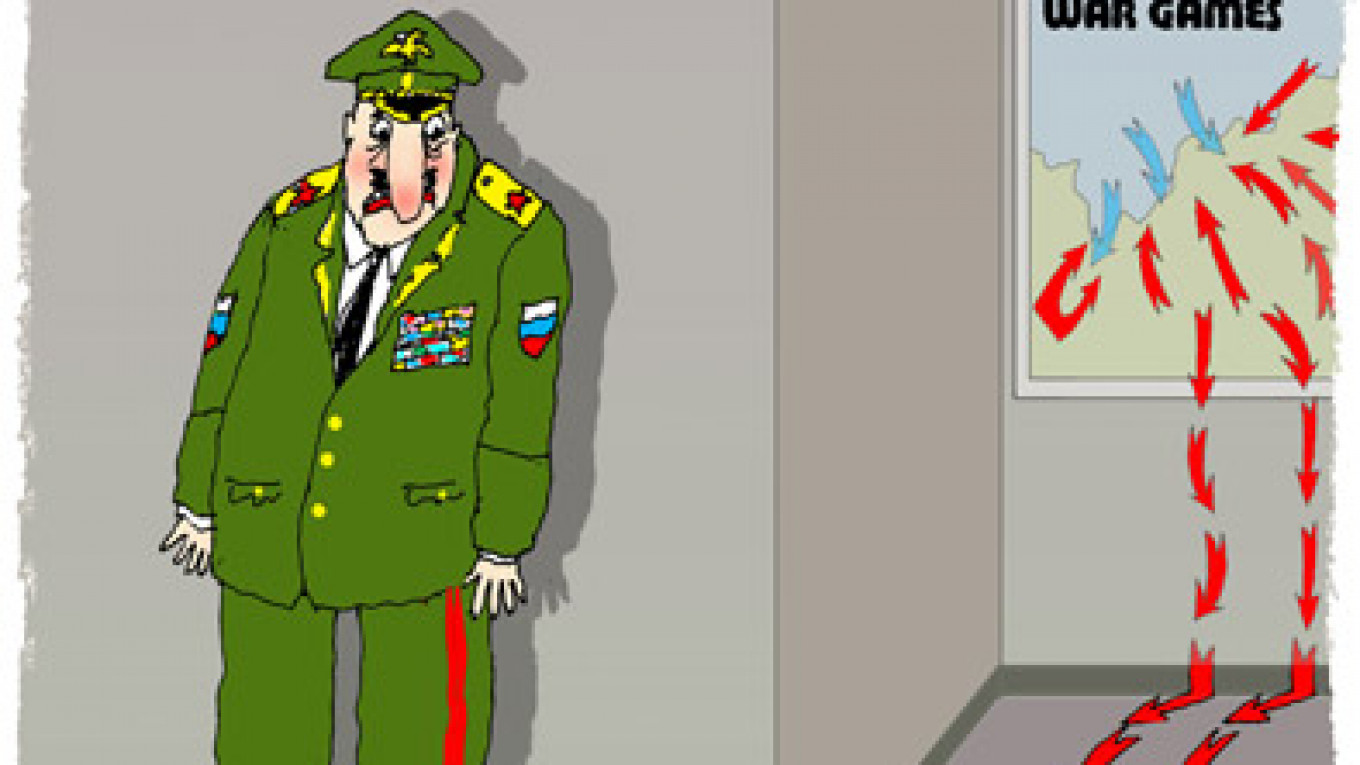Russia's armed forces conducted major military maneuvers last week, but they were only war games, thank God, and not the real thing. Ships from its Northern Fleet hunted down submarines of an imaginary enemy and garrisons of polar troops fought off simulated air strikes.
Part of the Black Sea Fleet also attacked an imaginary enemy in the southwestern region of the Black Sea. According to media reports, Russia deployed Iskander tactical missiles to the Kaliningrad region and Tu-22 aerial bombers to Crimea as part of the maneuvers. It was all presented as part of a snap inspection that President Vladimir Putin announced on March 16.
In fact, Russia simulated a so-called "large-scale war." That's military jargon for global warfare — the type of conflict that would inevitably end with the destruction of all life on this planet. It is logical to assume that this snap inspection would continue with the launch of strategic missiles because that is how such conflicts escalate.
If Russia does not send up those missiles, it will indicate that these really were previously unplanned maneuvers. After all, Moscow is obligated to notify Washington of such moves in advance.
Putin most likely issued that order in retaliation for NATO's decision to conduct military maneuvers in the Baltic and Black seas after Russia annexed Crimea and deployed troops and equipment to the war in southeast Ukraine.
Obviously, Putin ordered the snap inspection to demonstrate Russia's greatly increased military power to his own people and to the world, and for that reason the maneuvers were probably planned in a rush.
In fact, the General Staff faced conflicting goals in carrying out the order. On the one hand, they had to stage as massive a show of force as possible to create the desired impression. On the other hand, the Vienna Document on confidence and security-building measures in Europe places strict limits on the concentration of troops: A state holding a snap inspection of troops can involve no more than 38,000 soldiers, and the maneuvers can last no more than 72 hours.
However, Russia wanted to stage a greater show of force than those limits permitted, so the Kremlin began manipulating the terms of the Vienna Document. It began by announcing a snap inspection of Western Military District and Airborne troops, long-range aviation and the Northern Fleet. The maneuvers were ostensibly meant to check control systems at the recently established Arctic Command.
However, that scale proved too small, so the top brass announced additional military exercises spanning all of Russia. In this way, officials hoped to thoroughly confuse Western states if they should suddenly demand that Russia comply with Vienna Document restrictions. However, in the resulting confusion, even the General Staff lost track of which units were in maneuvers where.
And in the final briefing for foreign military attaches, General Staff Main Operations Directorate head Lieutenant General Andrei Kartopolov announced, without even batting an eye, that Russia actually staged snap inspections in all of its military districts.
Meanwhile, Deputy Defense Minister Anatoly Antonov attempted to deflect blame by leveling accusations at the foreign military attaches. "You are just scaring yourselves with the horror stories you create," he told them. "I am here to tell you today that we are not going to attack anyone. We simply have no need for that," Antonov said.
Of course, it remains to be seen whether Ukraine — from whom Russia just seized a major chunk of territory — would agree with that claim.
And what exactly did Moscow manage to demonstrate with its snap inspections? Russia's military brass has been talking for years about beefing up its defenses in the Arctic. To this end, Moscow deployed two Arctic brigades consisting of several dozen people charged with building an airfield on the New Siberian Islands.
The obvious question here is how two or three "Arctic brigades" could possibly defend Russia's gigantic northern coastline stretching from Murmansk to Vladivostok. Equally interesting is how Russia plans to deliver the thousands of tons of airplane fuel to the air base so as to supply the aircraft that would patrol that vast area.
The snap inspection of "Arctic forces" should have answered those questions. Instead, it only demonstrated that it is impossible to carry out the illusory task of defending Russia's Arctic coastline with the troops currently stationed in the region.
The General Staff could not come up with any better task for these maneuvers than to pull pages from the old Cold War playbook — that is, search and destroy enemy subs and aircraft carrier groups. And as for protecting Russia' northern coast, a company of paratroopers — that had to fly all the way from central Russia — was supposed to secure the threatened areas.
The so-called "Arctic brigades" were instructed to neutralize several subversive groups that just happened to appear in the middle of that vast wasteland right in their own backyard. In fact, this snap inspection only confirmed that Russia's placement of troops in the Arctic has no practical purpose.
In the event of a real military threat, Moscow would have to deploy troops there from central Russia. What's more, it is worse than naive to imagine that the insidious enemy would land its invasion forces precisely where Russia has stationed its Arctic brigades — or even as close as 200 kilometers from their locations.
Meanwhile, Russia's senior military officials unwittingly contradicted one another. Deputy Defense Minister Antonov avowed that Russia was not threatening anyone, even as Kartopolov of the General Staff candidly announced that "naval aircraft of the Black Sea Fleet struck enemy air and sea forces in the southwestern part of the Black Sea and simulated the destruction of Black Hawk-type drones."
Kartopolov effectively named the potential aggressor in these games because only the United States possesses such drones.
Thus, Moscow has returned to the strategic paradigm of the 1980s: direct military confrontation with the West. The only difference is that Russia no longer has an army of 5 million men. Kartopolov was candid on this point as well. "Considering Russia's vast territory and the negligible size of its armed forces," he said, "we must be prepared to respond appropriately."
Apparently, the General Staff has concluded that it must compensate for the "negligible size" of its armed forces with threatening statements and provocative actions.
Alexander Golts is deputy editor of the online newspaper Yezhednevny Zhurnal.
A Message from The Moscow Times:
Dear readers,
We are facing unprecedented challenges. Russia's Prosecutor General's Office has designated The Moscow Times as an "undesirable" organization, criminalizing our work and putting our staff at risk of prosecution. This follows our earlier unjust labeling as a "foreign agent."
These actions are direct attempts to silence independent journalism in Russia. The authorities claim our work "discredits the decisions of the Russian leadership." We see things differently: we strive to provide accurate, unbiased reporting on Russia.
We, the journalists of The Moscow Times, refuse to be silenced. But to continue our work, we need your help.
Your support, no matter how small, makes a world of difference. If you can, please support us monthly starting from just $2. It's quick to set up, and every contribution makes a significant impact.
By supporting The Moscow Times, you're defending open, independent journalism in the face of repression. Thank you for standing with us.
Remind me later.







